Transitional Words and Phrases
One of your primary goals as a writer is to present ideas in a clear and understandable way. To help readers move through your complex ideas, you want to be intentional about how you structure your paper as a whole as well as how you form the individual paragraphs that comprise it. In order to think through the challenges of presenting your ideas articulately, logically, and in ways that seem natural to your readers, check out some of these resources: Developing a Thesis Statement , Paragraphing , and Developing Strategic Transitions: Writing that Establishes Relationships and Connections Between Ideas.
While clear writing is mostly achieved through the deliberate sequencing of your ideas across your entire paper, you can guide readers through the connections you’re making by using transitional words in individual sentences. Transitional words and phrases can create powerful links between your ideas and can help your reader understand your paper’s logic.
In what follows, we’ve included a list of frequently used transitional words and phrases that can help you establish how your various ideas relate to each other. We’ve divided these words and phrases into categories based on the common kinds of relationships writers establish between ideas.
Two recommendations: Use these transitions strategically by making sure that the word or phrase you’re choosing matches the logic of the relationship you’re emphasizing or the connection you’re making. All of these words and phrases have different meanings, nuances, and connotations, so before using a particular transitional word in your paper, be sure you understand its meaning and usage completely, and be sure that it’s the right match for your paper’s logic. Use these transitional words and phrases sparingly because if you use too many of them, your readers might feel like you are overexplaining connections that are already clear.
Categories of Transition Words and Phrases
Causation Chronology Combinations Contrast Example
Importance Location Similarity Clarification Concession
Conclusion Intensification Purpose Summary
Transitions to help establish some of the most common kinds of relationships
Causation– Connecting instigator(s) to consequence(s).
accordingly as a result and so because
consequently for that reason hence on account of
since therefore thus
Chronology– Connecting what issues in regard to when they occur.
after afterwards always at length during earlier following immediately in the meantime
later never next now once simultaneously so far sometimes
soon subsequently then this time until now when whenever while
Combinations Lists– Connecting numerous events. Part/Whole– Connecting numerous elements that make up something bigger.
additionally again also and, or, not as a result besides even more
finally first, firstly further furthermore in addition in the first place in the second place
last, lastly moreover next second, secondly, etc. too
Contrast– Connecting two things by focusing on their differences.
after all although and yet at the same time but
despite however in contrast nevertheless nonetheless notwithstanding
on the contrary on the other hand otherwise though yet
Example– Connecting a general idea to a particular instance of this idea.
as an illustration e.g., (from a Latin abbreviation for “for example”)
for example for instance specifically that is
to demonstrate to illustrate
Importance– Connecting what is critical to what is more inconsequential.
chiefly critically
foundationally most importantly
of less importance primarily
Location– Connecting elements according to where they are placed in relationship to each other.
above adjacent to below beyond
centrally here nearby neighboring on
opposite to peripherally there wherever
Similarity– Connecting to things by suggesting that they are in some way alike.
by the same token in like manner
in similar fashion here in the same way
likewise wherever
Other kinds of transitional words and phrases Clarification
i.e., (from a Latin abbreviation for “that is”) in other words
that is that is to say to clarify to explain
to put it another way to rephrase it
granted it is true
naturally of course
finally lastly
in conclusion in the end
to conclude
Intensification
in fact indeed no
of course surely to repeat
undoubtedly without doubt yes
for this purpose in order that
so that to that end
to this end
in brief in sum
in summary in short
to sum up to summarize


Improving Your Writing Style
This is an accordion element with a series of buttons that open and close related content panels.
Clear, Concise Sentences
Use the active voice
Put the action in the verb
Tidy up wordy phrases
Reduce wordy verbs
Reduce prepositional phrases
Reduce expletive constructions
Avoid using vague nouns
Avoid unneccessarily inflated words
Avoid noun strings
Connecting Ideas Through Transitions
Using Transitional Words and Phrases

100+ Useful Words and Phrases to Write a Great Essay
By: Author Sophia
Posted on Last updated: October 25, 2023
Sharing is caring!
How to Write a Great Essay in English! This lesson provides 100+ useful words, transition words and expressions used in writing an essay. Let’s take a look!
The secret to a successful essay doesn’t just lie in the clever things you talk about and the way you structure your points.
Useful Words and Phrases to Write a Great Essay
Overview of an essay.

Useful Phrases for Proficiency Essays
Developing the argument
- The first aspect to point out is that…
- Let us start by considering the facts.
- The novel portrays, deals with, revolves around…
- Central to the novel is…
- The character of xxx embodies/ epitomizes…
The other side of the argument
- It would also be interesting to see…
- One should, nevertheless, consider the problem from another angle.
- Equally relevant to the issue are the questions of…
- The arguments we have presented… suggest that…/ prove that…/ would indicate that…
- From these arguments one must…/ could…/ might… conclude that…
- All of this points to the conclusion that…
- To conclude…
Ordering elements
- Firstly,…/ Secondly,…/ Finally,… (note the comma after all these introductory words.)
- As a final point…
- On the one hand, …. on the other hand…
- If on the one hand it can be said that… the same is not true for…
- The first argument suggests that… whilst the second suggests that…
- There are at least xxx points to highlight.
Adding elements
- Furthermore, one should not forget that…
- In addition to…
- Moreover…
- It is important to add that…
Accepting other points of view
- Nevertheless, one should accept that…
- However, we also agree that…
Personal opinion
- We/I personally believe that…
- Our/My own point of view is that…
- It is my contention that…
- I am convinced that…
- My own opinion is…
Others’ opinions
- According to some critics… Critics:
- believe that
- suggest that
- are convinced that
- point out that
- emphasize that
- contend that
- go as far as to say that
- argue for this
Introducing examples
- For example…
- For instance…
- To illustrate this point…
Introducing facts
- It is… true that…/ clear that…/ noticeable that…
- One should note here that…
Saying what you think is true
- This leads us to believe that…
- It is very possible that…
- In view of these facts, it is quite likely that…
- Doubtless,…
- One cannot deny that…
- It is (very) clear from these observations that…
- All the same, it is possible that…
- It is difficult to believe that…
Accepting other points to a certain degree
- One can agree up to a certain point with…
- Certainly,… However,…
- It cannot be denied that…
Emphasizing particular points
- The last example highlights the fact that…
- Not only… but also…
- We would even go so far as to say that…
Moderating, agreeing, disagreeing
- By and large…
- Perhaps we should also point out the fact that…
- It would be unfair not to mention the fact that…
- One must admit that…
- We cannot ignore the fact that…
- One cannot possibly accept the fact that…
Consequences
- From these facts, one may conclude that…
- That is why, in our opinion, …
- Which seems to confirm the idea that…
- Thus,…/ Therefore,…
- Some critics suggest…, whereas others…
- Compared to…
- On the one hand, there is the firm belief that… On the other hand, many people are convinced that…
How to Write a Great Essay | Image 1

How to Write a Great Essay | Image 2

Phrases For Balanced Arguments
Introduction
- It is often said that…
- It is undeniable that…
- It is a well-known fact that…
- One of the most striking features of this text is…
- The first thing that needs to be said is…
- First of all, let us try to analyze…
- One argument in support of…
- We must distinguish carefully between…
- The second reason for…
- An important aspect of the text is…
- It is worth stating at this point that…
- On the other hand, we can observe that…
- The other side of the coin is, however, that…
- Another way of looking at this question is to…
- What conclusions can be drawn from all this?
- The most satisfactory conclusion that we can come to is…
- To sum up… we are convinced that…/ …we believe that…/ …we have to accept that…
How to Write a Great Essay | Image 3

- Recent Posts
- Plural of Process in the English Grammar - October 3, 2023
- Best Kahoot Names: Get Creative with These Fun Ideas! - October 2, 2023
- List of Homophones for English Learners - September 30, 2023
Related posts:
- How to Write a Formal Letter | Useful Phrases with ESL Image
- 50+ Questions to Start a Conversation with Anyone in English
- Useful English Greetings and Expressions for English Learners
- Asking for Help, Asking for Opinions and Asking for Approval
Nur Syuhadah Zainuddin
Friday 19th of August 2022
thank u so much its really usefull
12thSeahorse
Wednesday 3rd of August 2022
He or she who masters the English language rules the world!
Friday 25th of March 2022
Thank you so so much, this helped me in my essays with A+
Theophilus Muzvidziwa
Friday 11th of March 2022
Monday 21st of February 2022
Good Phrases For Composition
- Thursday, Feb 17th, 2022
- By: BIG IDEAZ
Some teachers encourage the use of good phrases in composition, while others frown upon them.
The important point to note is, students should not simply memorise good phrases and try to use as many of them in their compositions as possible for the sake of using them.
Teachers will not be impressed.
What teachers are looking for in a piece of good composition is a well-developed content that is clearly and descriptively expressed with a wide range of suitable vocabulary.
“Xin Yu finds it easy to start her writing now. She already used it to write her two school assignments. Also the good phrases, she used them too and her school teacher commented ‘good use of phrases’!”
~ Parent of Xin Yu (P3)
Using Good Phrases in English Compositions
One way to widen your range of vocabulary is to learn more good phrases.
Naturally, the more phrases you have in your vocabulary bank, the more word choices you will have when you need to describe something in your compositions.
Some students use the same word or phrase multiple times in a composition. That is usually due to a lack of vocabulary. It is not enjoyable to read this kind of writing.
Students should know a wide range of words or phrases, so that they are able to pick and choose the more appropriate ones in their descriptions.
Get our FREE resource of 120 Good Phrases for Compositions delivered to your inbox today!
Your child can use these phrases in his or her compositions.
Good Phrases To Describe Emotions
Here are just some of the good phrases to describe emotions that we teach our students.
Describing Sadness:
- eyes brimmed with tears
- wailed in sorrow
- on the verge of tears
- tears welled up in her eyes
- face etched with misery
Describing Anger
- eyes narrowed with contempt
- seething with rage
- glared at me with dagger-like eyes
- stood there with her arms akimbo
Describing Fear / Shock
- terror gripped my heart
- a chill ran down my spine
- trembling with fear
- heart was pulsating wildly
Describing Happiness
- a smile spread across her face
- face lit up with joy
- whistling a merry tune
Describing Anxiety
- pacing up and down
- glanced at his watch for the twentieth time
- hands turned cold and clammy
Describing Pain
- a sharp pain surged through
- howled in agony
- cried in excruciating pain
The examples above are some of the good phrases for composition that we teach our students. A child who knows more phrases is at a greater advantage than one who has limited vocabulary.
However, knowing good phrases is just the first step. Students need to understand and apply the phrases correctly to make their compositions interesting. Click here to read some of our students’ compositions.
Find out more about how our Writing Coaches mark our students’ English compositions here .
Testimonial
“Hong Yun has shown improvement in SA1 compared to his SA2 last year. I have read through his SA1 compo and I was surprised that he could use a number of good sentences and there were only very few grammatical errors, mainly in punctuation. In fact, his compo was one of those that his English teacher read out to the entire class upon return of the paper for checking. In my parents’ meeting with teacher, the teacher commended him for his effort and asked him to continue with the good practice of writing regularly. I could see the vast improvement he made so far in his writing this half a year and I think the regular writing helps.”
~ Parent of Hong Yun (Primary 4)
Visit our FREE resources page to get more resources for primary school English composition.
Related posts:.
Author: BIG IDEAZ
Click on the icon below to chat on WhatsApp or email us at [email protected] or self-help with our FAQs .
Prompt response during working hours on weekdays/Saturdays.
Words To Use In Essays: Amplifying Your Academic Writing
Use this comprehensive list of words to use in essays to elevate your writing. Make an impression and score higher grades with this guide!
Words play a fundamental role in the domain of essay writing, as they have the power to shape ideas, influence readers, and convey messages with precision and impact. Choosing the right words to use in essays is not merely a matter of filling pages, but rather a deliberate process aimed at enhancing the quality of the writing and effectively communicating complex ideas. In this article, we will explore the importance of selecting appropriate words for essays and provide valuable insights into the types of words that can elevate the essay to new heights.
Words To Use In Essays
Using a wide range of words can make your essay stronger and more impressive. With the incorporation of carefully chosen words that communicate complex ideas with precision and eloquence, the writer can elevate the quality of their essay and captivate readers.
This list serves as an introduction to a range of impactful words that can be integrated into writing, enabling the writer to express thoughts with depth and clarity.
Significantly
Furthermore
Nonetheless
Nevertheless
Consequently
Accordingly
Subsequently
In contrast
Alternatively
Implications
Substantially
Transition Words And Phrases
Transition words and phrases are essential linguistic tools that connect ideas, sentences, and paragraphs within a text. They work like bridges, facilitating the transitions between different parts of an essay or any other written work. These transitional elements conduct the flow and coherence of the writing, making it easier for readers to follow the author’s train of thought.
Here are some examples of common transition words and phrases:
Furthermore: Additionally; moreover.
However: Nevertheless; on the other hand.
In contrast: On the contrary; conversely.
Therefore: Consequently; as a result.
Similarly: Likewise; in the same way.
Moreover: Furthermore; besides.
In addition: Additionally; also.
Nonetheless: Nevertheless; regardless.
Nevertheless: However; even so.
On the other hand: Conversely; in contrast.
These are just a few examples of the many transition words and phrases available. They help create coherence, improve the organization of ideas, and guide readers through the logical progression of the text. When used effectively, transition words and phrases can significantly guide clarity for writing.
Strong Verbs For Academic Writing
Strong verbs are an essential component of academic writing as they add precision, clarity, and impact to sentences. They convey actions, intentions, and outcomes in a more powerful and concise manner. Here are some examples of strong verbs commonly used in academic writing:
Analyze: Examine in detail to understand the components or structure.
Critique: Assess or evaluate the strengths and weaknesses.
Demonstrate: Show the evidence to support a claim or argument.
Illuminate: Clarify or make something clearer.
Explicate: Explain in detail a thorough interpretation.
Synthesize: Combine or integrate information to create a new understanding.
Propose: Put forward or suggest a theory, idea, or solution.
Refute: Disprove or argue against a claim or viewpoint.
Validate: Confirm or prove the accuracy or validity of something.
Advocate: Support or argue in favor of a particular position or viewpoint.
Adjectives And Adverbs For Academic Essays
Useful adjectives and adverbs are valuable tools in academic writing as they enhance the description, precision, and depth of arguments and analysis. They provide specific details, emphasize key points, and add nuance to writing. Here are some examples of useful adjectives and adverbs commonly used in academic essays:
Comprehensive: Covering all aspects or elements; thorough.
Crucial: Extremely important or essential.
Prominent: Well-known or widely recognized; notable.
Substantial: Considerable in size, extent, or importance.
Valid: Well-founded or logically sound; acceptable or authoritative.
Effectively: In a manner that produces the desired result or outcome.
Significantly: To a considerable extent or degree; notably.
Consequently: As a result or effect of something.
Precisely: Exactly or accurately; with great attention to detail.
Critically: In a careful and analytical manner; with careful evaluation or assessment.
Words To Use In The Essay Introduction
The words used in the essay introduction play a crucial role in capturing the reader’s attention and setting the tone for the rest of the essay. They should be engaging, informative, and persuasive. Here are some examples of words that can be effectively used in the essay introduction:
Intriguing: A word that sparks curiosity and captures the reader’s interest from the beginning.
Compelling: Conveys the idea that the topic is interesting and worth exploring further.
Provocative: Creates a sense of controversy or thought-provoking ideas.
Insightful: Suggests that the essay will produce valuable and thought-provoking insights.
Startling: Indicates that the essay will present surprising or unexpected information or perspectives.
Relevant: Emphasizes the significance of the topic and its connection to broader issues or current events.
Timely: Indicates that the essay addresses a subject of current relevance or importance.
Thoughtful: Implies that the essay will offer well-considered and carefully developed arguments.
Persuasive: Suggests that the essay will present compelling arguments to convince the reader.
Captivating: Indicates that the essay will hold the reader’s attention and be engaging throughout.
Words To Use In The Body Of The Essay
The words used in the body of the essay are essential for effectively conveying ideas, providing evidence, and developing arguments. They should be clear, precise, and demonstrate a strong command of the subject matter. Here are some examples of words that can be used in the body of the essay:
Evidence: When presenting supporting information or data, words such as “data,” “research,” “studies,” “findings,” “examples,” or “statistics” can be used to strengthen arguments.
Analysis: To discuss and interpret the evidence, words like “analyze,” “examine,” “explore,” “interpret,” or “assess” can be employed to demonstrate a critical evaluation of the topic.
Comparison: When drawing comparisons or making contrasts, words like “similarly,” “likewise,” “in contrast,” “on the other hand,” or “conversely” can be used to highlight similarities or differences.
Cause and effect: To explain the relationship between causes and consequences, words such as “because,” “due to,” “leads to,” “results in,” or “causes” can be utilized.
Sequence: When discussing a series of events or steps, words like “first,” “next,” “then,” “finally,” “subsequently,” or “consequently” can be used to indicate the order or progression.
Emphasis: To emphasize a particular point or idea, words such as “notably,” “significantly,” “crucially,” “importantly,” or “remarkably” can be employed.
Clarification: When providing further clarification or elaboration, words like “specifically,” “in other words,” “for instance,” “to illustrate,” or “to clarify” can be used.
Integration: To show the relationship between different ideas or concepts, words such as “moreover,” “furthermore,” “additionally,” “likewise,” or “similarly” can be utilized.
Conclusion: When summarizing or drawing conclusions, words like “in conclusion,” “to summarize,” “overall,” “in summary,” or “to conclude” can be employed to wrap up ideas.
Remember to use these words appropriately and contextually, ensuring they strengthen the coherence and flow of arguments. They should serve as effective transitions and connectors between ideas, enhancing the overall clarity and persuasiveness of the essay.
Words To Use In Essay Conclusion
The words used in the essay conclusion are crucial for effectively summarizing the main points, reinforcing arguments, and leaving a lasting impression on the reader. They should bring a sense of closure to the essay while highlighting the significance of ideas. Here are some examples of words that can be used in the essay conclusion:
Summary: To summarize the main points, these words can be used “in summary,” “to sum up,” “in conclusion,” “to recap,” or “overall.”
Reinforcement: To reinforce arguments and emphasize their importance, words such as “crucial,” “essential,” “significant,” “noteworthy,” or “compelling” can be employed.
Implication: To discuss the broader implications of ideas or findings, words like “consequently,” “therefore,” “thus,” “hence,” or “as a result” can be utilized.
Call to action: If applicable, words that encourage further action or reflection can be used, such as “we must,” “it is essential to,” “let us consider,” or “we should.”
Future perspective: To discuss future possibilities or developments related to the topic, words like “potential,” “future research,” “emerging trends,” or “further investigation” can be employed.
Reflection: To reflect on the significance or impact of arguments, words such as “profound,” “notable,” “thought-provoking,” “transformative,” or “perspective-shifting” can be used.
Final thought: To leave a lasting impression, words or phrases that summarize the main idea or evoke a sense of thoughtfulness can be used, such as “food for thought,” “in light of this,” “to ponder,” or “to consider.”
How To Improve Essay Writing Vocabulary
Improving essay writing vocabulary is essential for effectively expressing ideas, demonstrating a strong command of the language, and engaging readers. Here are some strategies to enhance the essay writing vocabulary:
- Read extensively: Reading a wide range of materials, such as books, articles, and essays, can give various writing styles, topics, and vocabulary. Pay attention to new words and their usage, and try incorporating them into the writing.
- Use a dictionary and thesaurus: Look up unfamiliar words in a dictionary to understand their meanings and usage. Additionally, utilize a thesaurus to find synonyms and antonyms to expand word choices and avoid repetition.
- Create a word bank: To create a word bank, read extensively, write down unfamiliar or interesting words, and explore their meanings and usage. Organize them by categories or themes for easy reference, and practice incorporating them into writing to expand the vocabulary.
- Contextualize vocabulary: Simply memorizing new words won’t be sufficient; it’s crucial to understand their proper usage and context. Pay attention to how words are used in different contexts, sentence structures, and rhetorical devices.
How To Add Additional Information To Support A Point
When writing an essay and wanting to add additional information to support a point, you can use various transitional words and phrases. Here are some examples:
Furthermore: Add more information or evidence to support the previous point.
Additionally: Indicates an additional supporting idea or evidence.
Moreover: Emphasizes the importance or significance of the added information.
In addition: Signals the inclusion of another supporting detail.
Furthermore, it is important to note: Introduces an additional aspect or consideration related to the topic.
Not only that, but also: Highlights an additional point that strengthens the argument.
Equally important: Emphasizes the equal significance of the added information.
Another key point: Introduces another important supporting idea.
It is worth noting: Draws attention to a noteworthy detail that supports the point being made.
Additionally, it is essential to consider: Indicates the need to consider another aspect or perspective.
Using these transitional words and phrases will help you seamlessly integrate additional information into your essay, enhancing the clarity and persuasiveness of your arguments.
Words And Phrases That Demonstrate Contrast
When crafting an essay, it is crucial to effectively showcase contrast, enabling the presentation of opposing ideas or the highlighting of differences between concepts. The adept use of suitable words and phrases allows for the clear communication of contrast, bolstering the strength of arguments. Consider the following examples of commonly employed words and phrases to illustrate the contrast in essays:
However: e.g., “The experiment yielded promising results; however, further analysis is needed to draw conclusive findings.”
On the other hand: e.g., “Some argue for stricter gun control laws, while others, on the other hand, advocate for individual rights to bear arms.”
Conversely: e.g., “While the study suggests a positive correlation between exercise and weight loss, conversely, other research indicates that diet plays a more significant role.”
Nevertheless: e.g., “The data shows a decline in crime rates; nevertheless, public safety remains a concern for many citizens.”
In contrast: e.g., “The economic policies of Country A focus on free-market principles. In contrast, Country B implements more interventionist measures.”
Despite: e.g., “Despite the initial setbacks, the team persevered and ultimately achieved success.”
Although: e.g., “Although the participants had varying levels of experience, they all completed the task successfully.”
While: e.g., “While some argue for stricter regulations, others contend that personal responsibility should prevail.”
Words To Use For Giving Examples
When writing an essay and providing examples to illustrate your points, you can use a variety of words and phrases to introduce those examples. Here are some examples:
For instance: Introduces a specific example to support or illustrate your point.
For example: Give an example to clarify or demonstrate your argument.
Such as: Indicates that you are providing a specific example or examples.
To illustrate: Signals that you are using an example to explain or emphasize your point.
One example is: Introduces a specific instance that exemplifies your argument.
In particular: Highlights a specific example that is especially relevant to your point.
As an illustration: Introduces an example that serves as a visual or concrete representation of your point.
A case in point: Highlights a specific example that serves as evidence or proof of your argument.
To demonstrate: Indicates that you are providing an example to show or prove your point.
To exemplify: Signals that you are using an example to illustrate or clarify your argument.
Using these words and phrases will help you effectively incorporate examples into your essay, making your arguments more persuasive and relatable. Remember to give clear and concise examples that directly support your main points.
Words To Signifying Importance
When writing an essay and wanting to signify the importance of a particular point or idea, you can use various words and phrases to convey this emphasis. Here are some examples:
Crucially: Indicates that the point being made is of critical importance.
Significantly: Highlights the importance or significance of the idea or information.
Importantly: Draws attention to the crucial nature of the point being discussed.
Notably: Emphasizes that the information or idea is particularly worthy of attention.
It is vital to note: Indicates that the point being made is essential and should be acknowledged.
It should be emphasized: Draws attention to the need to give special importance or focus to the point being made.
A key consideration is: Highlight that the particular idea or information is a central aspect of the discussion.
It is critical to recognize: Emphasizes that the understanding or acknowledgment of the point is crucial.
Using these words and phrases will help you convey the importance and significance of specific points or ideas in your essay, ensuring that readers recognize their significance and impact on the overall argument.
Exclusive Scientific Content, Created By Scientists
Mind the Graph platform provides scientists with exclusive scientific content that is created by scientists themselves. This unique feature ensures that the platform offers high-quality and reliable information tailored specifically for the scientific community. The platform serves as a valuable resource for researchers, offering a wide range of visual tools and templates that enable scientists to create impactful and visually engaging scientific illustrations and graphics for their publications, presentations, and educational materials.

Subscribe to our newsletter
Exclusive high quality content about effective visual communication in science.
Sign Up for Free
Try the best infographic maker and promote your research with scientifically-accurate beautiful figures
no credit card required
Content tags

Useful Academic Expressions & Phrases For Essay Writing
These useful academic expressions , words, vocabulary and phrases will help you to write a top-notch essay. Writing an essay can be a challenging task. However it becomes simpler if it is divided into manageable pieces. There are three main parts in an essay: an introduction, a body, and a conclusion. You can easily overcome your essay writing task with these academic phrases and vocabulary for essay writing.

Phrases to Finish an Introduction Paragraph
In this essay, I will look at some of the arguments for This essay will discuss different ways of … This essay outline some of the reasons why… Let us examine both views before reaching a concrete decision. The following essay takes a look at both sides of the argument.
Vocabulary for Opinion Essay
In my opinion, I strongly agree with the idea that … I strongly disagree with the idea that … I strongly opine that… I strongly believe that… In my view… As far as I am concerned… It seems to me that… However, I strongly believe that… I oppose the view and my reasons will be explained in the following paragraphs. I will support this view with arguments in the following paragraphs. I personally believe that… Thus the advantages far outweigh the disadvantages…
Useful Expressions For Listing Your Ideas
First… First of all… Firstly… First and foremost… Initially… To begin with… To start with… In the first place…
On the one hand… Second(ly)… (do not use ‘Second of all’) Third(ly)… Then… Next… After that… And… Again… Also… Besides… Likewise… In addition… Consequently… What’s more… Furthermore… Moreover… Apart from that…
Finally… Last but not the least…
Check Also: Vocabulary for Starting Your Essay How to Write The Best Essay Ever!
Phrases to Show a Comparison in Your Essay
In the same way… Likewise… Similarly… Like the previous point… Similar to… Also… At the same time… Just as…
Useful Vocabulary and Phrases to Show Contrast
On the other hand… On the contrary… However… Nevertheless…/ Nonetheless… But… Nonetheless/ Nevertheless… Oppositely… Alternatively… Unlike… While… Whilst… Although… Though… Even though… Despite… / In spite of… In spite of the fact that… Alternatively… In contrast to this… Then again… On the other hand… Despite the fact that… Even so… Yet… Meanwhile…
Vocabulary For Expressing Condition
If… Provided that… Because of that… For this reason… Unless… Providing that… So that… In case… Whether…
Phrases for Expressing Certainty in Your Essay
Certainly… Definitely… No doubt… Of course… Doubtlessly… Without any doubt… Undoubtedly…
Vocabulary for Adding Further Information
In addition… And… Moreover… Similarly… Furthermore… Also… As well as… Besides… Even… Too… What’s more… Again… In a similar fashion… Likewise…
Expressions for Agreement & Disagreement in Your Essay
While writing your essay, as a writer you are required to show whether you agree & disagree or partially agree with a given statement or opinion.
Vocabulary for Expressing Agreement
I strongly agree… I completely agree that… I totally agree with the given idea that… I agree with the opinion that… I am quite inclined to the opinion that… I accept that… I accept the fact that… I am in agreement… I consent that…
Vocabulary for Expressing Disagreement
I disagree with the opinion that… I strongly disagree… I completely disagree with… I totally disagree with the given idea that… I disagree with the statement… I quite oppose the opinion that… I disapprove that… I totally do not accept the fact that… My own opinion contradicts… I disagree with the group of people… However, my opinion is different from…
Vocabulary for Expressing Partial Agreement
To some extent… In a way… I agree with the given statement to some extent… Up to a point, I agree… More or less… So to speak…
Essay Writing Expressions PDF
Essay Expression PDF – (download)
You May Also Like
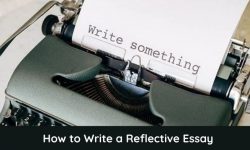
Guide on How to Write a Reflective Essay

10+ Fast Ways to Learn and Remember English Vocabulary
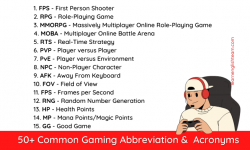
50+ Common Gaming Abbreviations & Acronyms List ✅
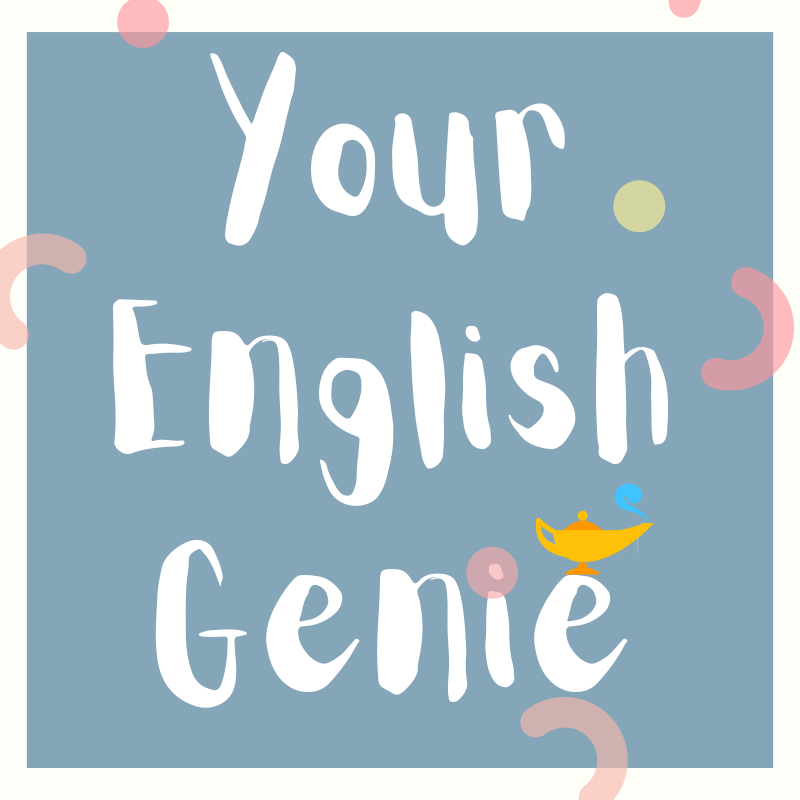
- All Products
- Free Resources and Tips
Say No to 'Boring' Vocabulary in Composition Writing
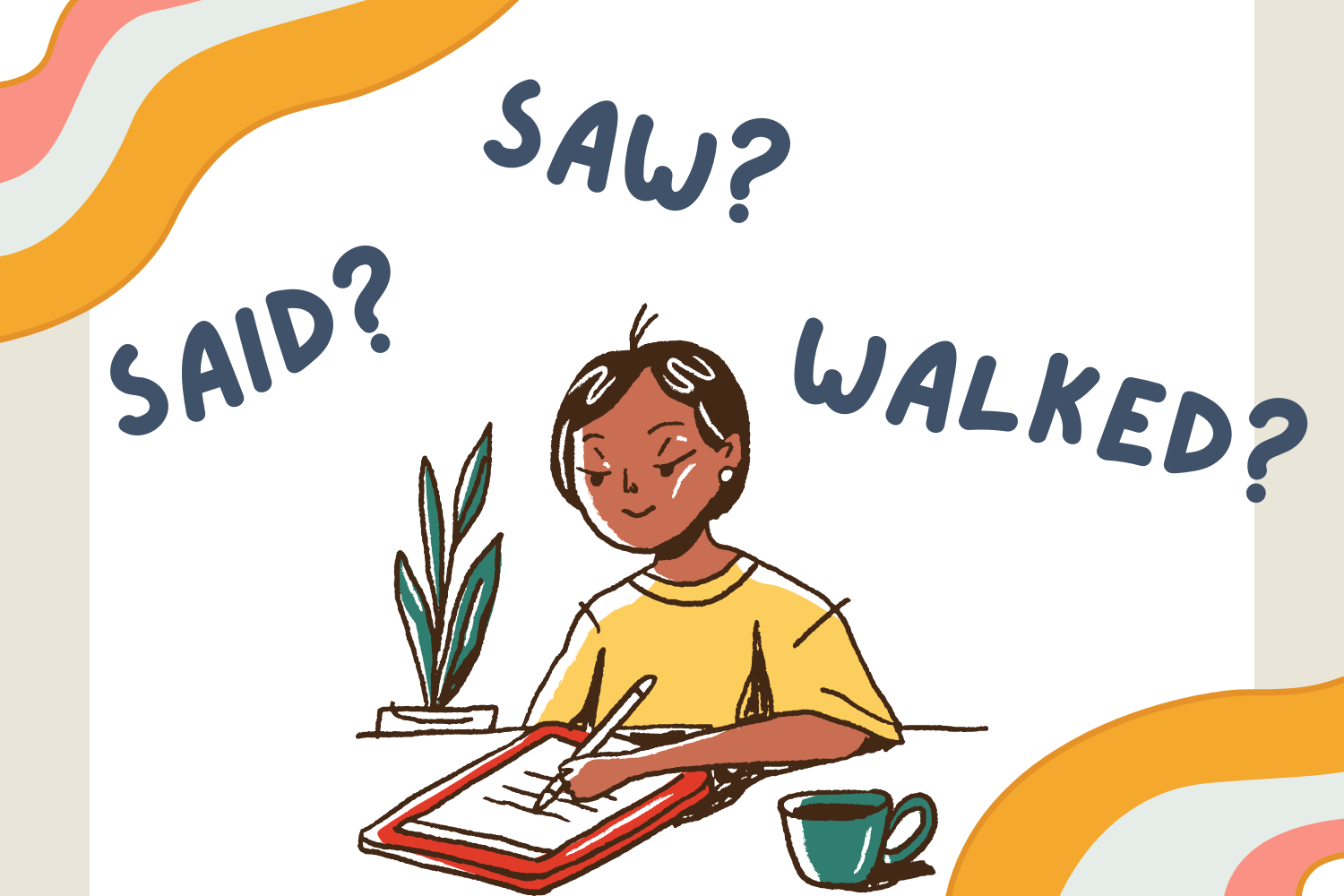
“Use good vocabulary in your composition!”
I am sure you have heard your English teacher say this at least once in your life.
Indeed, embellishing your compositions with descriptive and precise vocabulary words allows you to express the story events in an interesting and vivid way. Knowing good vocabulary also helps you vary your sentences and avoid repeating the same words over and over again. This makes your story a lot easier and more pleasant to read.
There are some words that are simply overused in composition writing. While there is nothing wrong with using these words, overusing them in every sentence or paragraph can make your writing seem boring and flat.
In this blog post, let me share with you some alternatives to three of the most overused words in composition writing.
The use of ‘said’ is especially common in writing that involves dialogue. A good composition should, of course, include some dialogue to show the interaction between the characters.
Read the following example:
“That’s it! I think we're lost!” said John.
“Don't worry, I have a map,” said Mary.
With the repeated use of the speech tag ‘said’, we are not able to express different tones and feelings of the speakers.
Hence, we can consider replacing the speech tags in this way:
“That’s it! I think we're lost!” cried John.
“Don't worry, I have a map,” Mary reassured .
Now, we have clearly shown that John was uttering his thoughts in exasperation , while Mary was reassuring him calmly .
Of course, it is important to note that the use of appropriate speech tags should be your number one priority. In other words, it might be better to use the word ‘said’ than to use a speech tag that does not fit into the context at all.
“That’s it! I think we're lost!” bellowed John. (X not appropriate)
Therefore, if you really cannot think of a better and more suitable speech tag to use, feel free to use the word ‘said’. However, consider vamping it up with the use of some extra descriptive details , such as adjectives, adverbs or actions, to show the speaker’s feeling and/or behaviour.
- “That’s it! I think we're lost!” said John exasperatedly .
- “That’s it! I think we're lost!” John said, sighing in exasperation .
- “That’s it! I think we're lost!” said John as he looked around helplessly .
- “Don't worry, I have a map,” Mary said kindly .
- “Don't worry, I have a map,” Mary said in a calm voice .
- “Don't worry, I have a map,” Mary said as she fished a folded map out of her bag .
Here are some useful words you can consider using as your speech tags!
- to shout in a loud, deep voice -> roared, bellowed, bawled
- to make a loud, high cry -> shrieked, screeched, squealed
- to speak in a soft voice -> whispered, murmured, mumbled
- to speak in an unclear way or with difficulty -> stammered, stuttered, hesitated
- to go on and on in a quick and excited way -> babbled, prattled, rambled
- to respond to another speaker -> replied, answered
Here is another word that is frequently used by writers. Again, there is nothing wrong with this word but there are more interesting ways to express the act of ‘seeing’ in different contexts.
- Just then, Jamie saw a suspicious man outside the shop.
- I saw a bird flying by my window.
- I shrieked in surprise when I saw a dirty cat all curled up in the lift.
We can replace the word ‘saw’ with words or phrases like these:
- Just then, Jamie noticed/espied a suspicious man outside the shop.
- I caught a glimpse of a bird flying by my window.
- I shrieked in surprise when I caught sight of a dirty cat all curled up in the lift.
Here are the words and phrases you can use to describe the act of seeing something/someone:
spotted, noticed, caught sight of, espied, detected, witnessed, observed
Again, not every word can be used in every context. Make sure to use the most suitable word that fits into the context of your sentence!
I spotted/observed a beautiful rainbow in the sky. (✓)
I detected/witnessed a beautiful rainbow in the sky. (X)
Last but not least, let’s take a look at some synonyms of the word ‘walked’. Characters in our stories may move in different ways. Using precise words to describe their movements can help your reader better imagine the scene.
Let's run through a few examples:
- Madam Wong was walking in the park leisurely.
- Upon reaching the fifth floor, Janet and I walked towards the infamously haunted classroom.
- Seething in anger, Mr Tan walked into the shop and yelled, “I want a refund!”
We can replace the word ‘walked’ with words or phrases like these:
- Madam Wong was strolling/ambling in the park leisurely.
- Upon reaching the fifth floor, Janet and I inched/crept towards the infamously haunted classroom.
- Seething in anger, Mr Tan stormed/marched into the shop and yelled, “I want a refund!”
Once again, pay attention to the context of your sentence before choosing the best vocabulary to use.
Here are some useful words you can consider using to describe different movements!
- to walk slowly or leisurely -> strolled, ambled, sauntered
- to walk in quick, short steps -> scurried, scampered, scuttled
- to walk forcefully, angrily or decisively -> stormed, stomped, marched
- to move quietly, carefully and slowly -> inched, crept, tiptoed
- to walk with slow, heavy steps -> trudged, plodded, tramped
- to walk proudly or confidently -> sashayed, strutted, swaggered, strode
How many of these words do you use in your compositions?
That’s all for today! Admittedly, it takes many building blocks to craft an effective story. Fret not! Your English Genie is here for you. Let’s pick up the blocks one by one!
Comments ( )
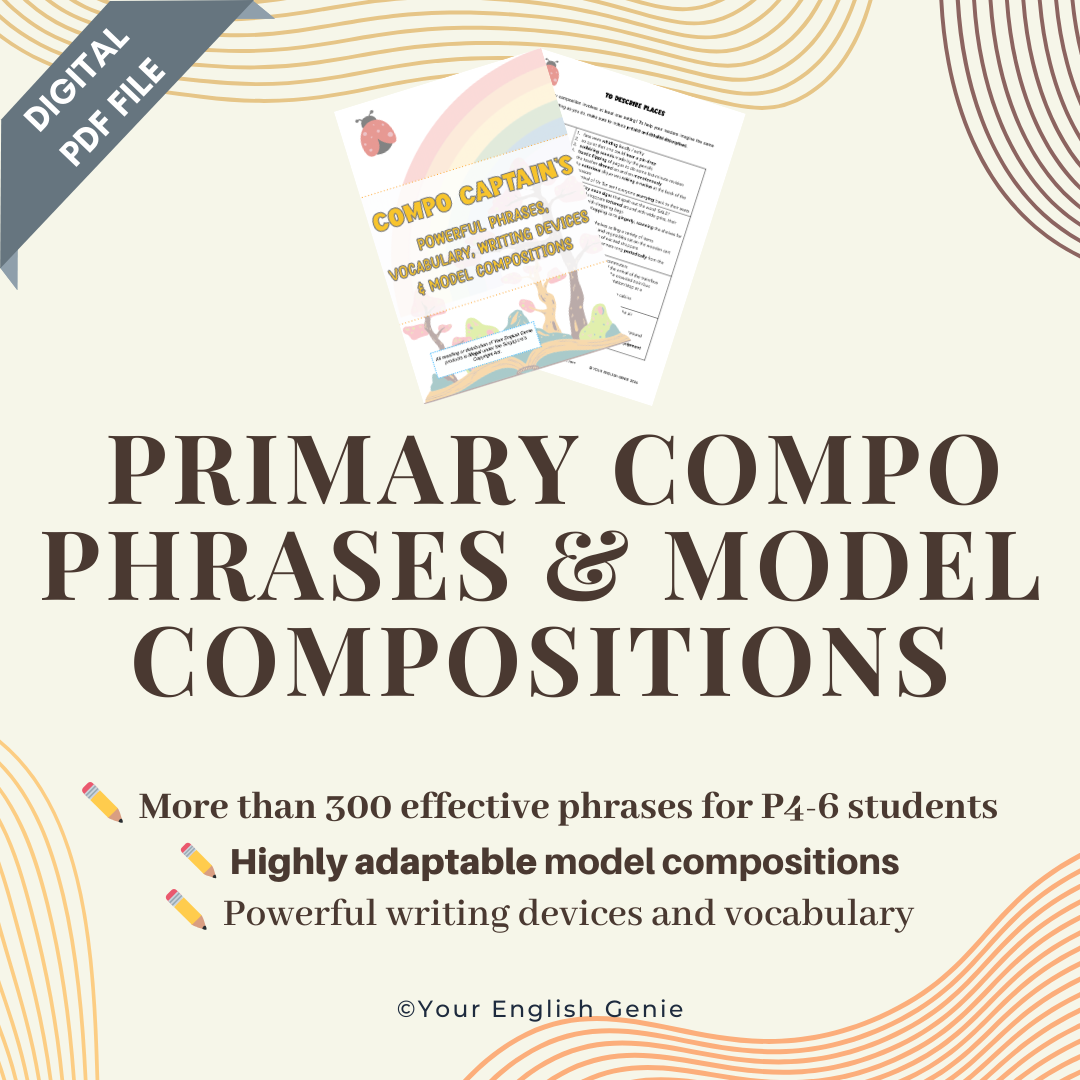
✏️ POWERFUL PHRASES AND DESCRIPTIONS TO BOOST YOUR COMPOSITION WRITING + HIGHLY ADAPTABLE AND VERSATILE MODEL COMPOSITIONS ✍️
The Compo Captain handbook boasts over 400 descriptive words and phrases that will help bring your story to life, as well as 8 adaptable model compositions that can be applied to a wide array of composition topics.
Suitable for Primary 4 to 6 students (PSLE), this booklet presents effective phrases to describe a huge variety of composition settings, characters, problem events and feelings. On top of that, you will learn how to make use of effective and fun writing devices to craft interesting and lively compositions!
Last but not least, you will be equipped with versatile and creative model compositions that can be easily adapted to address various composition topics.
The Compo Captain handbook is also great for vocabulary building !
This booklet covers:
✔️ phrases to describe places/settings that are widely used in compositions
✔️ phrases to describe dynamic characters that you can involve in your writing
✔️ phrases to describe problem events that are highly relevant to primary composition topics
✔️ powerful words and phrases to describe characters' feelings in an impactful way (say no to using words like 'happy' and 'sad'!)
✔️ guidance, tips and examples illustrating the use of writing devices such as similes, metaphors, hyperboles and personification
✔️ powerful words to replace basic words like "said", "walked", "saw" and "ran", etc.
✔️ 8 model compositions with well-developed and creative story plots; highly adaptable to different composition topics you may get in your examinations (more than 90 composition themes and topics!)
Say GOODBYE to boring and flat writing descriptions that sound like a report! Join Compo Captain in acquiring new building blocks for your writing skills today!
💯 The writer of this guide is an experienced English Teacher and Curriculum Developer who has vast experience in teaching PSLE English and creating effective content for Primary and Secondary students.
Copyright @ 2024 Your English Genie. All Rights Reserved.
- American Express
By using this website, you agree to our use of cookies. We use cookies to provide necessary site functionality and provide you with a great experience.
Post A Comment
Flag comment.
Are you sure you'd like to flag this comment as inappropriate?
Thank you for commenting
Your comment is awaiting moderation, and will be published as soon as it has been approved
Delete Comment
You're logged in as the blog owner. Would you like to delete this comment?
Your message has been successfully sent
Your form has been submitted. Please check your email for a copy of your responses. If you're accepted, you'll receive an email with a link to checkout.
Could not add item to cart

Raising Standards; Changing Lives
Good Phrases For Composition Writing In English

Are you ready to take your child’s writing to the next level? Discover the secret to captivating the examiner’s attention from the very first line.
Introducing good phrases for English composition writing – the key to transforming your child’s composition from ordinary to extraordinary. Imagine your child holding the reader’s interest with every carefully chosen word as ideas flow seamlessly, and the story unfolds effortlessly.
Mastering this art is not only essential for academic success, it also opens the door to effective communication and self-expression. So, without further ado, let’s learn the power of good phrases for composition writing.
Table of Contents
Essential Categories Of Good Phrases
Connective phrases.
Connective phrases are the glue that hold ideas together, ensuring a seamless reading experience. By incorporating these phrases, your child can create a well-structured and coherent composition that flows effortlessly from one point to another.
- Examples : moreover, in contrast, for instance, nevertheless, therefore, subsequently

Descriptive Phrases
Descriptive phrases breathe life into a composition by evoking emotions, sensations, and vivid images. Skilful use of these phrases helps readers visualise the scenes and characters, making your child’s writing more immersive and engaging.
- Examples : a gentle whisper, piercing gaze, meticulously arranged, cautiously approached.
Sentence Starters (Varied Openings)
Diverse sentence starters make your child’s compositions more engaging by avoiding repetition and monotony. Starting sentences with varied phrases keeps the reader interested and eager to know what comes next.
- Examples: amidst the…, taking into consideration…, overwhelmed by…, with great anticipation
Expressing Opinions
Expressing an opinion with conviction helps persuasively convey your child’s perspective. Use phrases that show confidence. These allow the reader to better understand and connect with your child’s thoughts.
- Examples : it seemed to me that, from my perspective, I was convinced that, there was no denying that
Comparing And Contrasting
If your child wants to include different viewpoints on a scene in the story, comparisons and contrasts will help with that. These phrases help to effectively demonstrate the similarities and differences between ideas of subjects.
- Examples : in the same vein, unlike, conversely, by comparison, however
Figures Of Speech
Figures of speech are expressive, imaginative, and often non-literal uses of language that allow writers and speakers to convey meaning more effectively and artistically. These linguistic devices can add depth, emphasis, and flair to your child’s writing, making the composition more engaging and memorable.
- Examples: as quick as a flash, a heart of gold, the calm before the storm, a sea of troubles
Concluding Phrases
Summarise compositions by offering concluding phrases that leave a lasting impression on the reader. Craft a powerful conclusion where your child reinforces the main ideas and brings the essay to a satisfactory close.
- Examples: the memory of what happened will remain etched in my mind, since then, I have learnt never to (insert negative action)again, this incident will thus serve as an important reminder to me of the time when.
Examples And Applications Of Words And Phrases In Composition Writing

Connective Phrases:
- “The sun shone brilliantly on the beach, attracting a crowd of sunbathers. In contrast , the nearby forest was cool and quiet, offering a peaceful retreat.”
- “He studied diligently for the exam, and as a result , he scored exceptionally well.”
- “The boy’s futile rage swept through him after the tragic loss of his friend. Nevertheless , he knew he had to carry on and fulfil their shared dream.”
- “The students worked together on the project, yet they still encountered several challenges along the way.”
- “She loved listening to classical music, whereas her brother preferred rock and roll.”
- “The dark clouds loomed ominously , signalling an approaching storm.”
- “All the crying from the baby ceased when she was gently rocked in her mother’s arms.”
- “A fragrant aroma of freshly baked bread filled the air, making everyone’s mouth water.”
- “Fear surrounded her as she walked through the dimly lit alley , with shadows lurking around every corner.”
- “The vibrant colours of the autumn leaves created a breathtaking tapestry on the forest floor.”
Sentence Starters
- “ Despite the challenges , she was determined to pursue her dreams.”
- “ With a heavy heart , he turned away, knowing he could never return.”
- “ Suddenly , loud cries pierced the night as the celebrations commenced.”
- “ Without warning , the ground began to shake, causing panic among the people.”
- “ Sensing danger , the animals in the forest suddenly grew silent.”
- “ From my perspective , John should not have been so rude to his teacher..”
- “I could not help but feel that something bad was going to occur”
- “It was clear to me that our choice was not the best one
- “ I believe that he has learnt his lesson and will not repeat it again
- “Mary was a pleasant child, while her brother John was a little tyrant.
- “Both dogs and cats make great pets, but dogs tend to be more loyal and protective, while cats are generally more independent.”
- “John was supposed to work with his team members to complete the project. However , he decided to ignore everyone and fly solo instead.
- “ The world is your oyster , presenting endless opportunities and experiences for those willing to explore and take risks.”
- “Her eyes sparkled like stars in the night sky , capturing everyone’s attention with their mesmerising beauty.”
- “His words were like a soothing balm , providing comfort and reassurance in times of distress.”
- “ Time flies , reminding us to cherish each moment and live life to the fullest.”
- “The silence in the room was deafening , amplifying the tension and anticipation felt by all present.”
- “ In light of what happened, John decided to turn over a new leaf and started to pull up his socks.
- “ Ultimately , being honest matters more than achieving victory, especially if the win was based on a lie.
- The memory of what happened will remain etched in my mind for a long time to come just like a stain on a pristine white wall.
Conclusion About Good Phrases For Composition Writing
As we’ve explored, mastering composition writing requires understanding the nuances of language, avoiding common misconceptions, and employing effective techniques. Embracing variety and originality and striking the right balance between simplicity and complexity can significantly enhance your compositions.
Looking to improve your English composition skills further? Enrol now at the best English tuition centre in Singapore ! DoApplied Learning by Epoch Talent Academy is headed by Teacher Daniel , an English language specialist and former award-winning MOE officer.
Get expert instruction and personalised support to elevate your writing abilities today. Contact us or check out our other useful guides for English primary and secondary students in Singapore.

Top 20 MOE-Registered Tuition Centres In Singapore
In Singapore, tuition centres supplement formal schooling, offering targeted support and enrichment beyond the classroom. The Ministry of Education (MOE) in Singapore rigorously oversees these

15 Commonly Misspelt Words In PSLE English Exams
As parents of students in Singapore, understanding the importance of spelling in the PSLE English exams is crucial. Spelling is a key component of effective

Continuous Writing: A Guide For PSLE English Composition
Continuous writing involves the art of storytelling through written words. It is a vital skill your child must master to excel in their English composition.

Practising Vs. Practicing For Mastering PSLE English Composition
Understanding the difference between practising vs practicing is a simple yet important part of the English language that often confuses many. In this post, we

Show Not Tell Phrases For PSLE English Composition
When it comes to writing, the show not tell writing approach is a powerful technique that can genuinely elevate your child’s PSLE English composition. Instead
Schedule Your Child’s Free Diagnostic Consultation (Worth $150) Today!

Information
- About Teacher Daniel
- Best English Tuition Centre in Singapore
- Primary School / PSLE English Tuition
- Secondary School / O Level English Tuition
Get In Touch!
- Testimonials
- Whatsapp : +65 9105 0593
English Tuition Locations
- English Tuition Bedok
- English Tuition Geylang
- English Tuition Marine Parade
- 86 Marine Parade Central #04-302 Singapore 440086

© 2024 All Rights Reserved.
Epoch Talent Academy Is Registered With The Ministry Of Education | Privacy Policy | Sitemap | Website and SEO by bestseo.sg
WhatsApp us

CLAIM YOUR FIRST TRIAL English TUITION SESSION FOR FREE (WORTH $100)
- Whatsapp Or Call +65 9105 0593

Good composition phrases – A quick and easy guide

Using good composition phrases in your Chinese compo can definitely add that wow factor into your writing. However, what kind of words or phrases qualify as good?
In this Chinese composition writing guide, we’ll cover the following:
- What is a good Chinese compo phrase
- Examples of good words and phrases that you can use in your Chinese composition
- Common mistakes that primary school kids make with these words and phrases
- What to take note of when using these words and phrases
Let’s dive right in!
What makes a Chinese composition phrase good?
Many parents and students believe that the good phrases that primary school teachers are looking out for are Chinese idioms (成语 cheng yu), classic sayings (俗语 su yu / 谚语 yan yu) and bombastic expressions.
As an ex-MOE Chinese teacher, I can tell that this is true only to a certain extent.
Think about this. Why do we want to write these so-called good phrases in our compositions in the first place?
You just want your compositions to sound more expressive and interesting, right? But this doesn’t mean they have to be complicated.
Good Chinese compo phrases can also include:
- Descriptive words and phrases
- Transitional phrases
Since there is no standard set of good words and phrases, don’t bother memorizing those so-called “good phrases” that you find in your Chinese assessment books or guide books you see at Popular bookstore. They are good resources, but memorization is too painful.
Instead, try coming up with your own unique expressions!
Sure, this takes some imagination and training. However, if you can pull it off, your Chinese composition is going to stand out from the typical model composition writings and sound much more natural!
To help you get started, here are some examples of good phrases that you can use for writing your next Chinese composition.
Good Chinese phrases for composition writing
Here are some examples of good Chinese phrases (作文好词好句) that can describe the feelings of a character in your compo!
Chinese compo phrases for happy
Chinese compo phrases for sad.
- 眼泪像断了线的珍珠似的
Phrases to describe anger in Chinese
Which of these Chinese compo word or phrases do you like?
Why should we use good words and phrases in our Chinese compositions
Good words and phrases can be helpful if you are the kind who finds yourself using the same words or phrases over and over again when you are doing your Chinese zuo wen.
Having a variety of Chinese compo phrases in your toolbox gives you the flexibility to express yourself a little differently each time.
Common misconception about good composition phrases
1. the more good phrases you use, the more impressive your compo is.
Many primary school children often make the mistake of memorizing these words and phrases without understanding.
That’s a big no-no.
Not only is memorizing painful, it kills the interest of learning in your primary school years.
If you want to use good phrases to improve your writing, you need to understand what the words and phrases mean so that you can use them correctly. Otherwise, your composition may end up sounding weird or even nonsensical.
So make sure that you really understand what each good phrase mean so that you can choose the most appropriate one to use for your writing. Being able to match the right phrase to the right situation is key to making your Chinese composition shine.
2. The more words and phrases in my compo, the merrier
Stuffing your Chinese composition with good phrases or idioms in every sentence isn’t going to impress your teachers and make you sound smart.
Instead, too many good words and phrases can make your story sound clunky and mechanical.
So here’s a tip! When it comes using descriptive words and phrases in your composition, less is more.
For example, if the characters in the story has not much emotions, focus on narrating the story clearly and be as descriptive as you can. Using the right transitional words instead of good words and phrases would help the flow of your composition.
However, if your main character is experiencing some very strong emotions, elaborate on that by using more descriptive words. You need to choose the right thing to focus on depending on the situation.
Acing your Chinese composition with/without good phrases

Throughout my decade of experience as a teacher and PSLE composition marker, I know that a good piece of writing isn’t graded based on how many good phrases are used.
Instead, it’s based on the quality of your content and your writing fluency. Being descriptive and expressive is a bonus, but if you can bring the same points across with simple words, you can ace your composition too!
So do be natural when writing, never use good phrases for the sake of using them because you have spent a lot of time learning. As long as your composition is a written in a clear and expressive manner, it’s possible to ace it!
Follow my blog for updates
- Composition Tips
- Comprehension Tips
- Useful Phrases
Get your free Chinese compo cheatsheet!
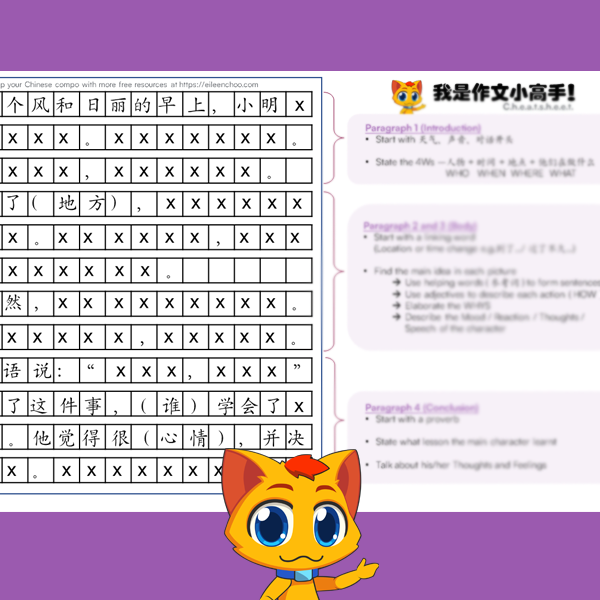
Recommended For You

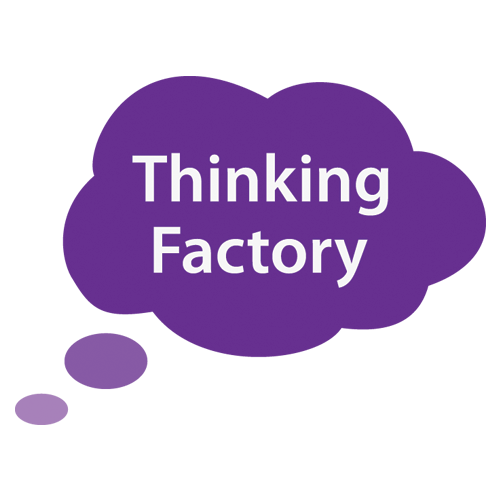
Words and Phrases for different writing scenarios
Below are lists of words and phrases that my P6 students and I have compiled together to write a happy scenario, a sad scenario or an exciting scenario. Please bear in mind these lists are not complete. They are just the beginning…
Words and phrases to write a happy scenario
A) introduction.
- The sun shone brilliantly and the water in the pond glittered invitingly.
- The sunset was glorious, all rosy and salmon-pink
b) Describing People
- Puffy cheeks/ broad muscular shoulders/ cute button nose/ soft and sweet voice/ with lovely curls/ long, soft and silky hair/ bright, sparkling eyes
c) Describing happiness
- Her heart was filled with overflowing joy.
- She felt surrounded by angels of joy.
- Her eyes twinkled with happiness.
- She was in high spirits.
- On cloud nine
- Smack one’s lips
- Over the moon
- Have a whale of a time
- Lend a helping hand
- Greet someone with open arms
e) Proverbs
- A friend in need is a friend indeed
- Every cloud has a silver lining
- Make hay while the sun shines
- Many hands make light work
- As happy as a lark
- As joyful as a fly
- As faithful as a dog
- As gentle as a dove
- As graceful as a swan
- As sharp as a razor
- As bright as a button
- As brilliant as stars
Words and phrases to write a sad scenario
- The morning was cold and wet with a brisk wind sweeping the rain across the land
b) Describing sadness/pain in dialogue
- An expression of acute agony on his face
c) Describing people
- Pale-looking
- Sunken cheeks
- Tremulous voice
- Unkempt hair
- Bloodshot eyes
- Dull, expressionless eyes
- Be on the rocks
- No laughing matter
- Down in the mouth
- Have the blues
- Get cold feet
- Bury the hatchet
- Could never see eye to eye
- Beggars can’t be choosers
- Its no use crying over spilt milk
- Time and tide wait for no man
- As sad as night
- As mournful as the grave
- As timid as a rabbit
- As calm as death
Words and phrases to write an Exciting scenario
- Black, ominious clouds covered the sky and released a sudden shower
b) Describing excitement/ panic
- Screams and loud cries pierced the air
- Everybody was fleeing franctically
- Horrible screams filled the air
- The scene was chaotic
- The wails of the fire engines could be heard
c) Describing dialogue and exciting phrases
- A wild shriek of rage
- A fearful peal of thunder
- I was paralysed with fear
- His eyes revolved in terror
- She felt a shiver go down her spine
- Hit the ceiling
- At the eleventh hour
- Keep a cool head
- Smelt a rat
- At each other’s throats
d) Describing people
- Full of pockmarks
- Bulbous nose
- A screeching voice
- Eyes as red as burning coals
- Alls well that ends well
- Out of the frying pan and into the fire
- As angry as a wasp
- As fierce as a lion
- As stubborn as a mule
- As dark as midnight
Check the other articles from this section
- Phrases to create suspense & Model Composition – Upper primary English
- Tips on preparing Primary 5 students for their PSLE year in Term 4 and model composition being late
- P5 Weighted Assessment Model Compo: Being Responsible
- 5 Situational Writing tips for P5 students
- P5 English Composition Writing: 4 ways to develop the theme when planning in composition writing & A Punishment model
- P5 Paper 1 Reminders for SA2 & Prelim composition model
- P5 Characterisation technique & Weighted Assessment Composition – A Competition
- Tips on how to improve your P5 composition writing
- P5 English Paper 1 Reminders & Model Composition – A new friend
- P5 SA2 Composition Theme – An act of honesty
- Three ways to score for your P5 composition & a model on A Surprise
- 3 simple writing techniques to make your P5 composition sparkle
- P5 Model Compositions & How we can make the most out of them
- P5 English Composition Encouraging Someone
- P5 English Composition An Act of Honesty
- English Composition an Unwelcomed Guest P5
- Compiled List of SA1 Composition Topics 2016
- 2016 List of SA2 Composition Topics P5
- Comparison of P5 and P6 Composition Writing & How we can help to bridge that gap
- Primary 5 Composition A Dangerous Situation
- Primary 5 Composition An Adventure & descriptive writing
- How to teach Composition Writing?
- P5 / P6 Composition model A good deed
- Narrative Writing P5 / P6
- How to plan a composition plot? P5
- Creative writing & the use of Idioms
- English Composition An Argument P5 & P6
- Compositions Settings
- PSLE English Composition model on the theme of ‘A Mishap’
- Primary 5 Composition Theme A Fun Day
- Primary 5 Composition Theme Cooking
- English composition Happiness model
- Phrases to create suspense – P5 / P6 Composition Writing
- Primary 5 English Comprehension Open-ended
- P5 English Composition model on the theme of ‘A wish that was fulfilled’
- 4 tips to manage composition themes well – P5
- P5 English Composition Protagonist vs Antagonist
- P5 English Composition A Bad Decision
- P5 Composition A Celebration Gone Wrong
- P5 English Composition : How to score for Paper 1 and model on Trusting Someone
Don’t Miss Any Future Post!
2024 P5 English Tuition Timetable

- school Campus Bookshelves
- menu_book Bookshelves
- perm_media Learning Objects
- login Login
- how_to_reg Request Instructor Account
- hub Instructor Commons
- Download Page (PDF)
- Download Full Book (PDF)
- Periodic Table
- Physics Constants
- Scientific Calculator
- Reference & Cite
- Tools expand_more
- Readability
selected template will load here
This action is not available.

1.4: Commas
- Last updated
- Save as PDF
- Page ID 247269

- Excelsior Online Writing Lab (OWL)
- Excelsior College
The Comma: Tricky, Mysterious, and Subjective?
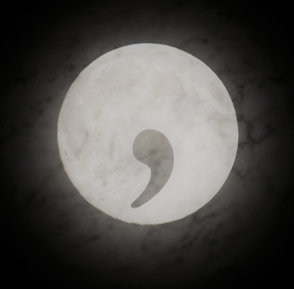
People often think commas are tricky and mysterious, and while they may be tricky if we aren’t familiar with the rules, they are not mysterious at all. They are not subjective, and no matter what your third-grade teacher told you, it’s probably not a good idea to place a comma wherever you feel the need to take a breath. What happens if you have a stuffy nose from a cold? Your essay might be littered with unnecessary commas.
There are actually some pretty clear-cut rules regarding commas, and while some rules seem to be clearer than others, at least in terms of how much most people understand, there are some basic comma rules that can help you know when and when not to use a comma.
With Coordinating Conjunctions
Use a comma with a coordinating conjunction when combining two independent clauses.
An independent clause is a term for a complete thought or sentence with both a subject and a verb. A coordinating conjunction is a conjunction that combines two equal elements and can combine two complete sentences. We have seven coordinating conjunctions in American English:
You may have heard of these referred to as the FANBOYS , which is a great way to help you remember all seven of the coordinating conjunctions.
Coordinating conjunctions can connect all kinds of words and phrases, but when they are used to connect independent clauses, we must place a comma before the coordinating conjunction, as illustrated in the following example:
I am preparing for a zombie invasion, and I am building a strong zombie fort around my home.
If the coordinating conjunction does not connect two independent clauses, you would not need a comma before the coordinating conjunction, as illustrated in the following example:
I am preparing for a zombie invasion and am building a strong zombie fort around my home.
In a Series
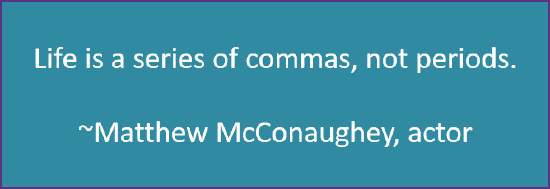
Use a comma to separate items in a series (three or more things).
You should even place a comma between the last two, although some writing style guidelines now omit this comma. In academic culture, we still use the serial or “Oxford” comma, so even punctuation rules have a rhetorical context. In some situations, you may not use the serial comma, but in academic writing you should, as illustrated in these examples:
She stayed up all night watching scary movies and ate popcorn, peanuts, and chocolate.
She ran into the house, shut the door, and locked all of the locks because she thought a werewolf was behind her.

With Introductory Phrases

Use commas after introductory words or phrases.
Subordinating conjunctions are words that connect, but unlike coordinating conjunctions , which connect equal parts, subordinating conjunctions connect dependent clauses (incomplete thoughts) to independent clauses. When you see a subordinating conjunction at the beginning of a sentence, this signals an introductory phrase, and you know a comma is coming at the end of that subordinate phrase, as illustrated in these examples:
Because his favorite team lost the Super Bowl, he would not speak to anyone about the game for two years.
Although they have stored a lot of food in their basement, I am not sure if they have enough for a zombie apocalypse.
Some of the most common subordinating conjunctions include the following:
common subordinating conjunctions
because although after while since
When these same phrases appear at the end of a sentence, they are not set off by commas, except in cases of strong contrast—for instance, in the case of the word although .
He would not speak to anyone about the game for two years because his favorite team lost the Super Bowl.
I am not sure if they have enough for a zombie apocalypse , although they have stored a lot of food in their basement.
You should also place a comma after introductory words, as illustrated in this example:
However, video games make great presents for a teenager.
Essential & Nonessential Information

Use commas in the middle of a sentence to set off words or phrases that are not essential to the meaning of the sentence.
The New York Yankees, who happen to be my favorite team, have won more World Series than any other team in baseball.
The Boston Red Sox, however, have won the World Series only seven times.
This rule can be a little tricky because of some misinformation we may have received at some point in elementary school. Were you ever taught that the trick to determining whether or not you need commas around information in the middle of a sentence was to pull out that information and see if the sentence was still complete? If the sentence was still complete, then you would know you needed a comma around that extra information.
Well, that doesn’t always work so well.
The best tip is to think about how meaning would be affected if you pulled out the word or phrase. If the meaning is not really affected, the word or phrase is not essential and should be placed inside a set of commas.
Conversely, it’s important to remember that essential words or phrases should not be set off with commas.
Her copy of Skyrim that I borrowed last week was the best game I have ever played and probably the best video game in the history of the world.
With Adjectives
Use a comma to separate coordinate adjectives describing the same noun.
An adjective is a word that describes a noun, and when we have two coordinate or “equal” adjectives describing the same noun, we need to place a comma between those adjectives, as illustrated in this example:
It was a stressful, sleepless night because I stayed up too late playing Dead Space.
If the adjectives aren’t coordinate, or “equal,” you should not separate them with a comma, as illustrated in this example:
Everyone knows the white frame house on Third Street is haunted.

A good trick to help you determine whether or not adjectives are coordinate is to try reading the sentence with the adjectives in reverse order or to add the word and between them. If the sentence would still make sense to you, the adjectives are coordinate, and you would need to separate them with a comma if they are describing a single noun.
Shifts at the End

Use a comma to separate coordinate elements at the end of a sentence or to indicate a distinct shift at the end of a sentence.
This comma rule is pretty straightforward. If you have a distinct shift at the end in content or a shift at the end for emphasis, you should set off that shift at the end with a comma.
You want me to fight Chuck Norris for you? I am brave , not crazy.
You are going to stand in line for the new Halo 4 , aren’t you?
With Quotes

Use a comma between the main discourse and a quote.
Whether you are writing dialog or setting up a quote from a source in your research essay, you should use a comma to separate the main discourse from your quote.
As Bilbo Baggins said, “I like half of you half as well as I should like, and like less than half of you half as well as you deserve!”
My favorite line in Shakespeare’s Macbeth is when the witches say, “Double, double, toil and trouble; fire, burn; and cauldron, bubble.”
Places & Dates

Use commas to set apart geographical names and to separate items in dates, except for between the month and the day.
When I heard zombies had been located in New York, New York, I knew it was time to move to Los Angeles, California .
It is a good thing that letter made it to 4 Privet Drive, Little Whinging, Surrey, England .
I know the Mayan calendar indicates the end of the world on December 21, 2012, but I am going to stick with Nostradamus because he gave us until 3797.
Comma Abuse

Finally, don’t abuse the poor comma. It hasn’t done anything to you. Well, it may have caused you some stress from time to time, but you should not abuse it. You should definitely not use a comma in the following instances:
- To separate a subject from a verb.
My zombie plan, involves the complete and utter failure of your zombie plan.
2. Between two verbs or verb phrases in a compound predicate.
Do those vampires really sparkle in the sunlight, and drink only animal blood?
3. Between two nouns or noun phrases in a compound subject.
Aggressive newbies, and campers are ruining the gaming experiences for me.
4. To set off a dependent clauses at the end of a sentence, except in cases of strong contrast.
My gaming confidence is at an all-time low, because I got pawned ten times by a second grader.
Tips from the Professor
Students often struggle with commas when it comes to using them correctly with the coordinating conjunctions— and , but , or , for , nor , so , and yet .
The important thing to remember is that you have to keep in mind what else is around that conjunction. You can’t assume that every time you use and you’ll need a comma. Sometimes, you will, and, sometimes, you won’t.
In the following interactive video, the Grammar Professor will explain more about why you have to think about what surrounds your coordinating conjunction before you can decide whether or not you need that comma.
- Share full article
Advertisement
Supported by
Guest Essay
A.I.-Generated Garbage Is Polluting Our Culture

By Erik Hoel
Mr. Hoel is a neuroscientist and novelist and the author of The Intrinsic Perspective newsletter.
Increasingly, mounds of synthetic A.I.-generated outputs drift across our feeds and our searches. The stakes go far beyond what’s on our screens. The entire culture is becoming affected by A.I.’s runoff, an insidious creep into our most important institutions.
Consider science. Right after the blockbuster release of GPT-4, the latest artificial intelligence model from OpenAI and one of the most advanced in existence, the language of scientific research began to mutate. Especially within the field of A.I. itself.

Adjectives associated with A.I.-generated text have increased in peer reviews of scientific papers about A.I.
Frequency of adjectives per one million words
Commendable

A study published this month examined scientists’ peer reviews — researchers’ official pronouncements on others’ work that form the bedrock of scientific progress — across a number of high-profile and prestigious scientific conferences studying A.I. At one such conference, those peer reviews used the word “meticulous” more than 34 times as often as reviews did the previous year. Use of “commendable” was around 10 times as frequent, and “intricate,” 11 times. Other major conferences showed similar patterns.
Such phrasings are, of course, some of the favorite buzzwords of modern large language models like ChatGPT. In other words, significant numbers of researchers at A.I. conferences were caught handing their peer review of others’ work over to A.I. — or, at minimum, writing them with lots of A.I. assistance. And the closer to the deadline the submitted reviews were received, the more A.I. usage was found in them.
If this makes you uncomfortable — especially given A.I.’s current unreliability — or if you think that maybe it shouldn’t be A.I.s reviewing science but the scientists themselves, those feelings highlight the paradox at the core of this technology: It’s unclear what the ethical line is between scam and regular usage. Some A.I.-generated scams are easy to identify, like the medical journal paper featuring a cartoon rat sporting enormous genitalia. Many others are more insidious, like the mislabeled and hallucinated regulatory pathway described in that same paper — a paper that was peer reviewed as well (perhaps, one might speculate, by another A.I.?).
What about when A.I. is used in one of its intended ways — to assist with writing? Recently, there was an uproar when it became obvious that simple searches of scientific databases returned phrases like “As an A.I. language model” in places where authors relying on A.I. had forgotten to cover their tracks. If the same authors had simply deleted those accidental watermarks, would their use of A.I. to write their papers have been fine?
What’s going on in science is a microcosm of a much bigger problem. Post on social media? Any viral post on X now almost certainly includes A.I.-generated replies, from summaries of the original post to reactions written in ChatGPT’s bland Wikipedia-voice, all to farm for follows. Instagram is filling up with A.I.-generated models, Spotify with A.I.-generated songs. Publish a book? Soon after, on Amazon there will often appear A.I.-generated “workbooks” for sale that supposedly accompany your book (which are incorrect in their content; I know because this happened to me). Top Google search results are now often A.I.-generated images or articles. Major media outlets like Sports Illustrated have been creating A.I.-generated articles attributed to equally fake author profiles. Marketers who sell search engine optimization methods openly brag about using A.I. to create thousands of spammed articles to steal traffic from competitors.
Then there is the growing use of generative A.I. to scale the creation of cheap synthetic videos for children on YouTube. Some example outputs are Lovecraftian horrors, like music videos about parrots in which the birds have eyes within eyes, beaks within beaks, morphing unfathomably while singing in an artificial voice, “The parrot in the tree says hello, hello!” The narratives make no sense, characters appear and disappear randomly, and basic facts like the names of shapes are wrong. After I identified a number of such suspicious channels on my newsletter, The Intrinsic Perspective, Wired found evidence of generative A.I. use in the production pipelines of some accounts with hundreds of thousands or even millions of subscribers.
As a neuroscientist, this worries me. Isn’t it possible that human culture contains within it cognitive micronutrients — things like cohesive sentences, narrations and character continuity — that developing brains need? Einstein supposedly said : “If you want your children to be intelligent, read them fairy tales. If you want them to be very intelligent, read them more fairy tales.” But what happens when a toddler is consuming mostly A.I.-generated dream-slop? We find ourselves in the midst of a vast developmental experiment.
There’s so much synthetic garbage on the internet now that A.I. companies and researchers are themselves worried, not about the health of the culture, but about what’s going to happen with their models. As A.I. capabilities ramped up in 2022, I wrote on the risk of culture’s becoming so inundated with A.I. creations that when future A.I.s are trained, the previous A.I. output will leak into the training set, leading to a future of copies of copies of copies, as content became ever more stereotyped and predictable. In 2023 researchers introduced a technical term for how this risk affected A.I. training: model collapse . In a way, we and these companies are in the same boat, paddling through the same sludge streaming into our cultural ocean.
With that unpleasant analogy in mind, it’s worth looking to what is arguably the clearest historical analogy for our current situation: the environmental movement and climate change. For just as companies and individuals were driven to pollute by the inexorable economics of it, so, too, is A.I.’s cultural pollution driven by a rational decision to fill the internet’s voracious appetite for content as cheaply as possible. While environmental problems are nowhere near solved, there has been undeniable progress that has kept our cities mostly free of smog and our lakes mostly free of sewage. How?
Before any specific policy solution was the acknowledgment that environmental pollution was a problem in need of outside legislation. Influential to this view was a perspective developed in 1968 by Garrett Hardin, a biologist and ecologist. Dr. Hardin emphasized that the problem of pollution was driven by people acting in their own interest, and that therefore “we are locked into a system of ‘fouling our own nest,’ so long as we behave only as independent, rational, free-enterprisers.” He summed up the problem as a “tragedy of the commons.” This framing was instrumental for the environmental movement, which would come to rely on government regulation to do what companies alone could or would not.
Once again we find ourselves enacting a tragedy of the commons: short-term economic self-interest encourages using cheap A.I. content to maximize clicks and views, which in turn pollutes our culture and even weakens our grasp on reality. And so far, major A.I. companies are refusing to pursue advanced ways to identify A.I.’s handiwork — which they could do by adding subtle statistical patterns hidden in word use or in the pixels of images.
A common justification for inaction is that human editors can always fiddle around with whatever patterns are implemented if they know enough. Yet many of the issues we’re experiencing are not caused by motivated and technically skilled malicious actors; they’re caused mostly by regular users’ not adhering to a line of ethical use so fine as to be nigh nonexistent. Most would be uninterested in advanced countermeasures to statistical patterns enforced into outputs that should, ideally, mark them as A.I.-generated.
That’s why the independent researchers were able to detect A.I. outputs in the peer review system with surprisingly high accuracy: They actually tried. Similarly, right now teachers across the nation have created home-brewed output-side detection methods , like adding in hidden requests for patterns of word use to essay prompts that appear only when copy-pasted.
In particular, A.I. companies appear opposed to any patterns baked into their output that can improve A.I.-detection efforts to reasonable levels, perhaps because they fear that enforcing such patterns might interfere with the model’s performance by constraining its outputs too much — although there is no current evidence this is a risk. Despite public pledges to develop more advanced watermarking, it’s increasingly clear that the companies are dragging their feet because it goes against the A.I. industry’s bottom line to have detectable products.
To deal with this corporate refusal to act we need the equivalent of a Clean Air Act: a Clean Internet Act. Perhaps the simplest solution would be to legislatively force advanced watermarking intrinsic to generated outputs, like patterns not easily removable. Just as the 20th century required extensive interventions to protect the shared environment, the 21st century is going to require extensive interventions to protect a different, but equally critical, common resource, one we haven’t noticed up until now since it was never under threat: our shared human culture.
Erik Hoel is a neuroscientist, a novelist and the author of The Intrinsic Perspective newsletter.
The Times is committed to publishing a diversity of letters to the editor. We’d like to hear what you think about this or any of our articles. Here are some tips . And here’s our email: [email protected] .
Follow the New York Times Opinion section on Facebook , Instagram , TikTok , WhatsApp , X and Threads .

IMAGES
VIDEO
COMMENTS
4. That is to say. Usage: "That is" and "that is to say" can be used to add further detail to your explanation, or to be more precise. Example: "Whales are mammals. That is to say, they must breathe air.". 5. To that end. Usage: Use "to that end" or "to this end" in a similar way to "in order to" or "so".
Transitional words and phrases can create powerful links between ideas in your paper and can help your reader understand the logic of your paper. However, these words all have different meanings, nuances, and connotations. Before using a particular transitional word in your paper, be sure you understand its meaning and usage completely and be sure…
3. "Spine-tinging" means "scary". (Again, wrong context.) Here's the revised sentence: "The onlookers were left mesmerised by the breathtaking sunset.". By replacing bombastic words with effective ones, you're well on your way to writing a good essay in English.
Sharing is caring! How to Write a Great Essay in English! This lesson provides 100+ useful words, transition words and expressions used in writing an essay. Let's take a look! The secret to a successful essay doesn't just lie in the clever things you talk about and the way you structure your points.
Note that in fixed phrases like "both x and y," you must use "and," not "as well as." Both my results as well as my interpretations are presented below. Both my results and my interpretations are presented below. Use of and/or. The combination of transition words "and/or" should generally be avoided in academic writing.
Describing Pain. a sharp pain surged through. howled in agony. cried in excruciating pain. The examples above are some of the good phrases for composition that we teach our students. A child who knows more phrases is at a greater advantage than one who has limited vocabulary. However, knowing good phrases is just the first step.
guide to the most important words and phrases to know in the field of English for Academic Purposes (EAP). This list gives around 370 important phrases for academic writing, grouped into 15 functional areas. Written phrases 1. Specifying topics and relations between ideas in terms of in relation to in/within the context of with respect to with ...
Here are some examples of strong verbs commonly used in academic writing: Analyze: Examine in detail to understand the components or structure. Critique: Assess or evaluate the strengths and weaknesses. Demonstrate: Show the evidence to support a claim or argument. Illuminate: Clarify or make something clearer.
To do this, use any of the below words or phrases to help keep you on track. 1. Firstly, secondly, thirdly. Even though it sounds obvious, your argument will be clearer if you deliver the ideas in the right order. These words can help you to offer clarity and structure to the way you expose your ideas.
Essay Expression PDF - (download) academic, essay expressions, essay writing. We share daily lessons, free English learning materials for ESL students and language learners from all over the world. These useful academic expressions, words, vocabulary and phrases will help you to write a top-notch essay. PDF also available.
A well-crafted phrase can breathe life into your writing, making it memorable and impactful. This article will explore the art of crafting good phrases for composition and provide ten examples for each aspect. The importance of good phrases in composition. Good phrases are the lifeblood of great writing.
1. What Makes A Good Composition In English? A good composition is well-structured, engaging, clear, and concise, with a strong introduction, well-developed paragraphs, and a powerful conclusion. It also showcases a rich vocabulary, varied sentence structures, and appropriate use of good phrases. 2.
️ POWERFUL PHRASES AND DESCRIPTIONS TO BOOST YOUR COMPOSITION WRITING + HIGHLY ADAPTABLE AND VERSATILE MODEL COMPOSITIONS ️. The Compo Captain handbook boasts over 400 descriptive words and phrases that will help bring your story to life, as well as 8 adaptable model compositions that can be applied to a wide array of composition topics. ...
Examples And Applications Of Words And Phrases In Composition Writing Connective Phrases: "The sun shone brilliantly on the beach, attracting a crowd of sunbathers. In contrast, the nearby forest was cool and quiet, offering a peaceful retreat." "He studied diligently for the exam, and as a result, he scored exceptionally well."
Good Phrases for Composition Writing. English composition writing is a common task in the school days and it helps students in improving their writing skill. However, writing composition is ...
So make sure that you really understand what each good phrase mean so that you can choose the most appropriate one to use for your writing. Being able to match the right phrase to the right situation is key to making your Chinese composition shine. 2. The more words and phrases in my compo, the merrier. Stuffing your Chinese composition with ...
11. By the skin of your teeth. 'By the skin of your teeth' means the same as the word 'barely'. Example: I made it to first place in the race by the skin of my teeth. 12. Call it a day. To 'call it a day' is to end work for the day. Example: I finished all my homework before calling it a day. 13.
100 Good phrases for composition In the realm of writing and composition, words are not mere tools; they are the vibrant colours that paint the canvas of your reader's imagination. A well-crafted phrase can breathe life into your writing, making it memorable and impactful.
Instead of "good phrases", focus on using - EFFECTIVE PHRASES. It's okay to use simple phrases! Keep your sentences short, concise, and straight to the point. Use the right words at the right time. Express your ideas fluently. Remember - You are writing to let the reader for the sake of enjoyment.
f) Similes. As angry as a wasp. As fierce as a lion. As stubborn as a mule. As dark as midnight. Check the other articles from this section. Phrases to create suspense & Model Composition - Upper primary English. Tips on preparing Primary 5 students for their PSLE year in Term 4 and model composition being late.
My daughter vocab has expanded!" - Mrs Anusha. "I've printed out this book for my kids to refer to before they start writing," - Mrs Fanny Wang. "Thanks Jerry, my kids found this very helpful," - Mrs Karen Lee. Simple and Easy to use! Good writing does not have to be complicated. We do not encourage the use of fancy, pompous phrases.
With Coordinating Conjunctions. Use a comma with a coordinating conjunction when combining two independent clauses. An independent clause is a term for a complete thought or sentence with both a subject and a verb. A coordinating conjunction is a conjunction that combines two equal elements and can combine two complete sentences. We have seven coordinating conjunctions in American English:
In other words, significant numbers of researchers at A.I. conferences were caught handing their peer review of others' work over to A.I. — or, at minimum, writing them with lots of A.I ...